#undertale meta
Explore tagged Tumblr posts
Text
one of my major thematic criticisms of undertale is a pretty understandable one on Toby's account but i wish it weren't so alot of fanworks keep this flaw around so ill talk about it. in undertale, the world revolves around the main cast, jevilism unintended. the only meaningful difference between who you kill is when the major characters die, the majority of them are just... exp. in the grand scheme of things. shouldn't they matter?
#undertale#undertale analysis#undertale meta#i know that deltarune seems to be bent towards deconstructing this somewhat but im talking about undertale#no supplementary materials go out to flesh out the lives of the npcs or the generic monsters after all#its kinda weird how there are generic monsters with apparently all the same personality#yes its a writing shortcut but alot of ut is pointing at writing shortcuts and going wouldnt that be fucked up if true
2 notes
·
View notes
Text

my notes on Frisk and Chara based on what I know ingame, without any headcanons. (Possibly controversial)
(The breaking down a bad analysis one is kinda outdated but here anyways lol)
my frisk doc lol
#undertale#undertale fanart#Undertale meta#Frisk#Frisk Undertale#Frisk the Human#Chara#Chara Undertale#Chara Dreemurr#I tried my best to stick with canon info as much as possible#Hope ya check out my tumblr analysises lol#kakishirocream#Kakishirocream is Yapping
19 notes
·
View notes
Text
Like, the point is that humans in Undertale, are, you know, humans. I don't want to use the word "real" because the characters of the game are also "real" within the themes of the game, but what I mean is they are literally referring to people outside of the game, like us Players, Toby Fox - the wizzard who sealed the monsters underground, etc.
The impression I got after playing the game for the first time and the one I'm still 95% sure of is that the True Pacifist ending is the ending where you accept monsters - video game characters, as people worth carrying about, see their stories through, connect with them, and only then these characters leave the Underground - the game, and into the human world.
That's what the whole human souls being more powerful then that of monsters and having determination - power to decide, is about. That's why appropriating human souls gives Flowey meta powers over the game itself. I think I am more powerful then literally any video game character like that.
Now how does that connect to the 6 human souls captured by Asgore? I have not a single clue, write a creepy pasta about it.
#ye ye undertale meta in the year of our lord 2025 full 10 years after the game released i know#every thing that can be said has long been said etc etc#i don't care I didn't speak English in 2015 I only learned about UT on 2018#*in#which was 7 years ago#jesus fucking christ#undertale#undertale meta#analysis#media analysis
3 notes
·
View notes
Text
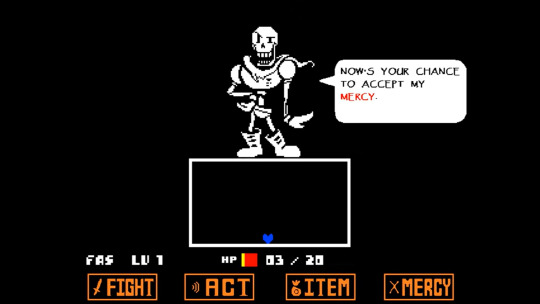
Any analysis of how Undertale deals with Pacifism and how it tries to guide the Player towards it has to take a deep look at Papyrus. Because Papyrus is the one character in the game who will never kill, the one actual ‘True Pacifist’ in the game’s main cast.
I mean, the Player can be an even bigger Pacifist. Papyrus does still FIGHT, and the Player can get through an entire run without draining a single sliver of HP. But… they can also be the world’s biggest murderbastard and literally stab reality to death.
Toriel would very much like to not kill, but she is also fully capable of doing so.

Same with Asgore, but he has a lot more actual blood on his hands. Undyne and Mettaton are both fully 100% willing to kill to accomplish their goals. Sans is non-violent in most runs because he’s too lazy and depressed to do anything, and when he is motivated into actions - it is in the form of a FIGHT to the death. Alphys… the timeline is a bit fuzzy cause both she and Mettaton love lying so much, but it seems like she did sincerely add deadly weapons to Mettaton cause killing humans would make him more 'useful' and then had second thoughts once she developed a parasocial relationship with the Human Child and THEN she and Mettaton started hatching their little play-acting plan. I think??
With Papyrus there is NONE of this ambiguity, we know for sure - no matter what timeline or what may come - The Great Papyrus will always choose MERCY.
And the interesting thing about that is on a Meta-Sense, Papyrus is a very rare example of the game giving MERCY towards the Player.
Because the game starts out being really obtuse with the Sparing mechanic and how it works. If you want to be a Pacifist in Undertale from the get-go, you’re gonna have to work for it. You're gonna have to figure it out on your own and commit to it and believe that it's possible. It's basically a test of your own belief in non-violence and your moral integrity. Then, the RUINS end with the Toriel boss battle - in a way, that’s probably the hardest Sparing puzzle in the whole game. And it’s very very easy to accidentally kill her. (I’d almost say that’s the intention of the battle, to try to goad the Player into Resetting so they can see how the game remembers across RESETs)

And then we have Papyrus, and it’s not just that his ‘Sparing Puzzle’ is something as simple as outlasting him and letting him run out of dialogue - and it’s not just that he’s the only boss that will just give up and let you continue if you lose to him enough times. it’s also that, just as Papyrus is the only boss incapable of accidentally killing the Player - he’s also the only boss that the player is incapable of accidentally killing.
(Okay, fine, to be pedantic, there’s also Asgore)

I mean, the Player can certainly kill him if they want to - but draining Papyrus’s HP just makes him skip through his battle dialogue right to the end of it. It’s designed in such a way that, no matter what Route you're on and no matter what approach you take with Papyrus - you will always end up on this screen.

Unlike basically any other Monster in this game, including the major boss battle just before him - you can’t kill Papyrus accidently. You can't kill him without also having Sparing him as an option. The game kinda treats killing Papyrus as one of the Worst Things You Can Do because killing Papyrus will always be a deliberate, considered action done to a person who will not kill you and who has stopped wanting to FIGHT and has extended a hand of Mercy. With the game clearly communicating what you need to do to Spare him at that moment.

And that means that - even if you killed before, even if you don’t have the patience of a True Pacifist, even if you spent all this time in the game without even trying to engage with the Sparing mechanic… as long as you don’t want to be a Huge Rat Bastard, the game is basically gifting you with the very very easy option to not be. Being a Pacifist in Undertale is usually a challenge - a puzzle to be solved, a test to pass. But as long as you aren’t intentionally trying to be the Worst Person - the game is basically giving you Papyrus.
If you accept his Mercy, you are accepting the game’s Mercy. That sort of benefit-of-the-doubt assumption that maybe all of the LOVE you might have accumulated so far was all due to honest mistakes or panic or an attempt in self-defense. That you still deserve this one chance to prove that you are not intentionally, maliciously cruel - or at least not like the Worst Person in the World. Even if you did kill before, you still deserve at least one friend.
And Sparing Papyrus leads you to his wonderful Hangout/Dating Sequence and to his Phone Calls and they all add so much wholesome charm to the Undertale experience and no matter what happens Papyrus will always think the best of the Player and he will always trust them and it also makes Sans also kinda your buddy by default. And more than just adding a little bit of wholesome charm into even the more LOVE-filled Playthroughs, I think this is meant to try and incentivize these players into trying out the Mercy mechanic a bit more.
Whatever it’s, like, for future playthroughs or Resetting the game right there to try a True Pacifist Run right there and then or just trying to be a little kinder for the rest of this current playthrough - especially since there’s an emphasis about the close friendship Papyrus has with the upcoming boss Undyne, and to a lesser extent with his idol and next-next boss battle Mettaton. It’s like “well, if you didn’t figure out how to spare before, this is how you do it? And isn’t it nice to have a friend? Isn’t it nice to not have to kill this lovable skeleton man? You should do this more often wink wink nudge nudge!”
And it’s like… all of Papyrus’ loved ones care about him so much but they also look down on his pacifism. They see his inability to kill and desire to make friends as simple naivete and that’s why all tend to hide the truth from him all the time. About what will happen to the Human he will capture, about what his new Human friend might’ve done, about the fact that they view him as so naïve.
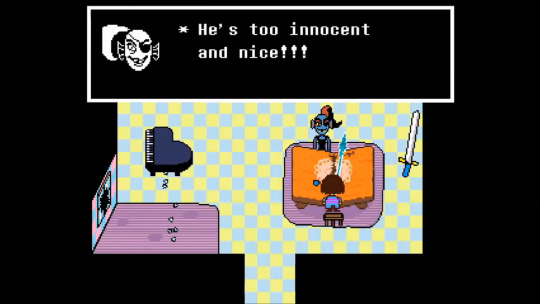
They admire it on some level, that’s why they want to protect it, but they also see it as a weakness which is why they want to protect it by lying to him all the time. But, you know, Undyne says that if Papyrus goes into battle he’ll be ‘ripped into little smiling shreds’ and that is certainly what happens every time a Player chooses to refuse Papyrus’ Mercy and the game’s Mercy and press that FIGHT button…

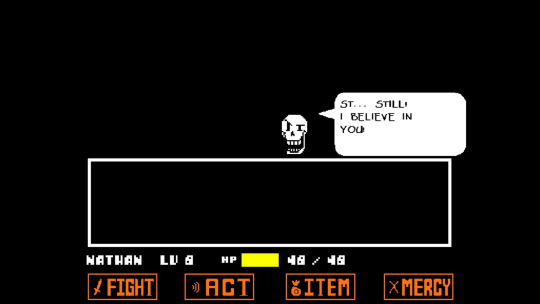
But have you thought about all the times that doesn’t happen? All the careless or violent players who were offered that skeletal hand of friendship, accepted it and then carried that offered kindness forward for the rest of the game? All the players motivated to do good for the sake of their buddy Papyrus? All the Murder Routes stopped because the player just didn’t have it in them to kill someone who believes in them so earnestly?
Like, no, it’s not a surefire thing - especially since Papyrus has so much less narrative power than the Actual Unkillable Time God that is the Player. But it happened, and it happened many many times to many players. Papyrus offered Mercy, the game offered Mercy. And much like Frisk’s Pacifism, it comes from a place of seeing the honest goodness in your ‘enemy’ and can inspire them to become a better person - this little sparkle of goodness being passed forwards.
And I think that’s beautiful, even if it didn’t happen in every timeline. Any potential future where Papyrus’ kindness can have such an effect on the Player and thus the entire trajectory of the Underground validates his kindness and pacifism on some level - even if there are also always the potential worlds that it backfires completely.
And there’s also one other way in which the Great Papyrus Proves Pacifism Pays. One that is a bit more practical, perhaps. And one that Papyrus himself is not even aware of.
Papyrus’ boss battle can be a surprisingly challenging one specifically because he is the only one who doesn’t kill the Player.
Like there is a reason why Papyrus will just offer you to skip his Fight after you lose to him three times, because if he didn’t do that - there’s an honest risk that the Player can get stuck in a much stuckier way than anywhere else in the game.
Because, like, for basically any other character in the game, being killed is the Worst Thing that could ever happen to them. For everyone except the actual Player Character because we are an Actual Unkillable Time God and dying is nothing more than a minor annoyance that sets you back to your last SAVE Point. So, leaving aside Papyrus’ admirably kind intentions - there is not much material difference from the Player’s perspective between getting Captured and getting a more traditional GAME OVER. Except…
Except getting Captured does not undo everything that happened in your inventory during the battle. In every other Undertale battle, if you use all of your items but still lose - the GAME OVER at least means you get your stuff back. But because Papyrus doesn’t kill you, any healing item you’ve used during the battle is still used. I have watched so many Undertale Let’s Players waste all of their valuable items on their first Papyrus battle and then have to face him again without them and thus do even worse in their second go… and then their third go... and thankfully then Papyrus offers them to skip the fight.
And while that technically can be circumvented by just manually closing the game and opening it back again on their pre-battle SAVE Point, a lot of players are gonna reflexively Save over it if they pop over to the Shop or the Snowed Inn before their second attempt at the battle. If Papyrus didn’t offer that chance to skip his battle, it could’ve easily become a softlock situation for a huge chunk of players - because he doesn’t kill the Player.
Most of Undertale deals with the value of non-violence from a standpoint of morality and kindness and personal connections. Since most people do die when they get killed. But when dealing with an Unkillable Time God like the Player, Papyrus proves that not-killing might actually be the most practical solution.
Of course, it doesn’t seem like Papyrus is aware of any of this. From his perspective, he is just offering genuine mercy to a being just as ephemeral as he is. But it accidentally turned into one of the most effective methods of blocking the Player’s way… at least he didn’t offer us an opt out so soon after that.
And it’s interesting when comparing him to how his brother Sans - one of the few people actually aware of the existence of SAVEs and RESETs - deals with the Player. Because the Sans boss battle at the end of the Murder Route is entirely based on the concept that death is nothing but an annoyance to the Player. Sans is less trying to kill the Player (the way Undyne the Undying did), he is simply trying to annoy the Player into a ragequit. But he is still killing the Player.
Now imagine a Sans battle where he has all of his usual annoying tricks, but also instead of killing you - he captures you just like his brother would’ve in a happier timeline. And while it’s not a fool-proof plan to stop the Player in their tracks - he could very easily stick them in that sort of softlock situation where they have to battle him again and again without any Healing Items. Forcing them to either abandon the game or RESET the whole world back the way it was - just like Sans wants them too.
But instead, by killing the Player, he is just allowing that perfect second-third-fourth-fifth-sixth-try where they get all of their Stuff back. And he does actually knows that. And why doesn’t he do that? (Speaking here from an in-universe character study perspective. Obviously the Doylist answer is that the game doesn’t want to Softlock you even in the most deliberately-frustrating part of the game).
Maybe, even though he intellectually knows that killing the Player will be of no help - he still does it because he wants to. Because he just wants to get back at the evil murderous monster that took his brother from him and destroyed his entire world even if he knows it’s actually ineffective. And this thirst for bloodshed is, ironically, blinding him from a new exciting way to actually practically stop that murderous bastard who is themself motivated entirely by bloodshed.
Maybe he just can’t do something like that. Reducing an enemy to exactly one HP and then stopping is not a feat anyone else in the game is capable of pulling off - even the ones who would obviously use such a thing (like Toriel or a Player with a Pacifist intentions). Maybe it’s something that requires a lot of hard practice and discipline and carefulness, that Sans never thought to put in because he didn’t see it as a useful skill the way Papyrus did.
Maybe that wouldn’t have worked anyways. After all, and that’s something I kinda touched on in a previous Overly Long Rambly Hot Take - Sans’ War of Attrition against the Player is greatly helped by the fact he can’t remember every single previous try and so he can’t get exhausted the way the Player can get. Obviously, without a GAME OVER induced RESET that will not apply. Which is especially notable because… Sans’ laziness is literally what brings him down at the end of that Boss Battle.

So maybe, while Papyrus, as long as you decline his offer to skip the battle, is capable of offering just the same Battle as before over and over and over again.... It’s possible that Sans just won’t be able to pull off two or three or more battles of the same intensity and difficulty in a row without a RESET to undo his own exhaustion.
But I think it’s at least worth considering the option, y’know? That after all this time of viewing Papyrus’ kindness as sweet-and-yet-kinda-foolish-naïveté - that exact viewpoint made Sans overlook the perfect solution to dealing with his little Murderous Time God problem. Cause he just never considered that while killing might be fully morally justifiable in this situation and very very satisfying, that does not necessarily mean it is actually the most practical solution. And that maybe, in a weirdly twisted way, Pacifism WAS the answer.
#undertale#ut#utdr#under tale#papyrus#the great papyrus#papyrus undertale#papyrus ut#sans#sans undertale#sans ut#sans the skeleton#papyrus the skeleton#undertale analysis#undertale meta#genocide route#genocide run
2K notes
·
View notes
Text
My big undertale fandom hot take is that I think there is a direct correlation between the number of people who boil the game's message down to "violence bad" and entirely miss the message about how to care for things responsibly + the number of people who hate alphys specifically and grossly underestimate her importance in the game.
It is so clear within the text of the game that Alphys is supposed to represent the type of person who would love Undertale. She represents fandom. I think the reason why she is hated so much (besides misogyny) is because we don't want to admit that she's a commentary on us.
There is a reason why the deciding factor separating a pacifistic neutral run from a true pacifist run is the alphys date/true lab segment. There's a reason why monsters literally cannot be free until she learns to love herself. There is a reason why she is the character who created flowey. There is a reason why she is important. There is a reason why you are asked to care about her. Think on that.
(Anyway watch dorked's video essay on alphys and hbomberguy's old undertale video. They explain Alphys' thematic importance more succinctly than I ever could.)
#🤓☝️ 'technically you can befriend alphys and still get a neutral ending' shut up#unintentionally the true lab can be read as a pretty solid analogy for the fan response to undertale#maybe not unintentionally. toby did make the baby is you after all#undertale#utdr#undertale fandom#undertale meta#alphys#alphys undertale#alphys meta
20 notes
·
View notes
Text
You ever think about how in the first encounter, Chara's name isn't there, and the options to Fight, Act, Item, or Spare aren't there. But in the next battle they all are. And how, rather than flames blocking Flowey's bullets as in the Don't Give Up sequence, the bullets just kinda... disappear, and your health recovers on its own.
You ever think about how this happens BEFORE Toriel shows up, and it's ambiguous who actually healed you and protected you, if it was her or your own power or...
You ever think about how Flowey didn't even realize where Chara was buried until that conversation in No Mercy.
You ever think really hard about how in No Mercy, Flowey briefly wonders if Chara came back because his best friend heard him calling out for them. And Chara claims that they woke up because 'your power' woke them up.
You ever think about Flowey throwing repeated screaming fits because the souls, his friends, his parents, the most important person in the world to him, they all come when Frisk calls out for help. But no one ever came when he called. And they're always, always, always coming to save Frisk from HIM. (Never to save him from humans, or loneliness, or even boredom.)
(But isn't the whole Asriel Dreemurr bossfight something of a cry for help? And doesn't someone save him then, a little late, but even so...?)
175 notes
·
View notes
Text
youtube
After nearly a decade, it's easy to forget what's canon and fanmade, and Sans' character has been interpreted in so many different ways that sometimes the line between Toby's writing and popular fan consensus gets blurry. In this video, I aim to analyze Sans as depicted in Undertale, Deltarune, and various official media written by Toby himself, like the anniversary Q&A, the alarm clock dialogue, the casino, and newsletter materials to provide a useful reference and fun look back at why Sans is such a cool character despite all the intense hype.
#undertale#sans#utdr#deltarune#undertale meta#undertale analysis#sans undertale#undertale sans#deltarune sans#character analysis#videos#video essay#Youtube
229 notes
·
View notes
Text
Undertale’s Meta Narrative: Understanding the player's three main narrative “stand-ins.”
For those who came in late or are currently playing deltarune, I'd like to take a moment to revisit Undertale, its parallel story, for the sake of context in themes. In this post I will analyze the meta-narrarive of Undertale as represented through its main characters.
Frisk, Chara and Flowey/Asriel each represent a core aspects of the player while being distinctly separate from the player. Because, unlike the player, they can't be removed from their world. Their context.
In Deltarune, (I haven't yet touched Ch. 4&5 because of exam season,) the questions of control, identity, freedom, escapist sentimentality etc. are central–and the game provides an even more mature exploration of them, through a protagonist that is both completely aware of the player's control and outwardly rejects them. There's a lot more to discuss when it comes to analyzing Kris, but this is an Undertale post first and foremost, to provide some context to the same themes.

1. Frisk:
Playable, but not representative of the player nor a self-insert. Their character is purposefully vague and quiet, so that you ASSUME they are a self-insert, (just as you assume it is them you are naming at the beginning of the game,) while actually having a full personality & agency of their own.
They choose how to deliver the lines you make them say & go out of their way to introduce themself to Asriel by name without you doing anything to prompt that. Also, all by themself, they ask Gerson what would happen if Asgore adopted them–if he'd continue aging. This implies a semblance of free will outside of the player–as well as them having their own desires.
I like to think that frisk is aware of Chara, but isn't aware of the fourth wall or the player as a separate entity. They go on to live their life, having no control over the player's choice to reset. Hence why Flowey tells you to let Frisk live their life. The determination stems from their soul, awakening Chara and having the power of resetting appear. But once they're out of the underground, it is not up to them.
However, when they are in the underground–they provide the player with choices. To me, the dialogue options, the Fight vs Mercy mechanic and everything else, are things that Frisk is considering already. Pondering on, thinking about. They won't actually do anything that goes completely against who they are, hence why they refuse to laugh at the amalgamates, or why they refuse to even consider taking the soda from undyne's house or alphys' fridge. They hate soda! They also don't let you take any more pieces of pie, because they're intimidated by it, even though it'd be very useful. Their personality also shines through by what they are given determination by. The simplest, most mundane things–from pointless garbage, to small mice in holes. They find beauty in everything.
So, we have the characterization down–but what does Frisk represt as a figure? As our playable character?
Frisk is at that vulnerable age when you are first developing your worldview based on your influences.
In the pacifist route, Frisk represents innocence. They follow the strongest influence they've had–assuming they are a parentless child, that being Toriel–and learn to practice the way of mercy.
They represent the player's pure-hearted sentimentality. The player's ability to just love the game and its characters, as they explore the underground. The player's desire to understand what's going on for the first time, make their choices, develop their playstyle all while falling in love with the friends they make along the way and deciding that, maybe I would rather stay.
Their pondering to kill comes from fear, perhaps, at first, in neutral routes. But in genocide? There is no, "despite everything, it's still you" but instead, "it's me, Chara/ {your name}," which means Frisk has entirely lost themself in the process of wiping everyone out and someone else's influence has taken over.
‼️The player sacrifices their connection to the world and characters to the altar of curiosity, (flowey) completion (chara) and the warped sentimentality of not wanting the game to end yet (asriel.) And so, the player has sacrificed Frisk, who represents exactly what made the pacifist route so moving. Connection.
Frisk is part of this world, the player isn't. Immersion broken, the narrative sacrificed, for a deeply unsatisfying process and a conclusion in which you literally sell your soul.

2. Flowey / Asriel:
Flowey is a character who, in order to fully understand, you do in fact have to play the game in each entirety. You have to become him in order to know him. He is everywhere, everything. The villain, the hero, the protagonist, the antagonist, the victim, the perpetrator, the tale of tragedy, the tale of hope, the tutorial for genocide, the key to true pacifist. The most important character in the whole entire game.
He represents the player's curiosity–and it's clear as day.
You know there won't be any real consequences. These characters aren't real, you can take it all back. And as you commit genocide after befriending everyone probably a hundred times over, you tell yourself, "I don't like this, I'm just doing this because I *have* to know what happens–" but do you?
Just because you can, does that mean you should?
Flowey becomes desensitized to violence and even dependent on it–in this world, it's kill or be killed. To challenge that mindset, is to pretend you haven't practiced it, haven't engaged in it–which is why he mocks you when you kill toriel, even accidentally–and then come back to spare her. He considers it inevitable that eventually, you'll play the game by his rules. And eventually, you do. Not because you have to, but because you can. In the friendly rpg where no-one has to die, you're still curious to see what happens *if.*
Flowey is unfeeling and disconnected. Soulless– even though another version of him really loves the people he's hurting now to see what happens. To see how they'll react. If he'll feel anything. If things will suddenly start making more sense and if his actions will start gaining purpose again. If he'll gain more information, maybe, instead of repetitive, predictable dialogue. And isn't that the whole situation of the player? The player, you–another version of whom loves these characters, hurting them to see how they'll react and if you'll gain new data. Curiosity killed the flower–and it chastises the player, too. Leaving them soulless and hollow.
Asriel, meanwhile, has all the love. Actively.
He has too much of it. He can feel everyone's heartbeat at the same time, aching for the same catharsis. He feels endlessly and he doesn't want that to end. He'll keep you there over and over because he doesn't want to let go of these feelings. He loves you, loves this world, this connection to the friends you've made–and doesn't want to return to nothingness.
He's willing to kill you again and again if it means you'll keep playing with him. He's willing to help you get different endings–willing to deprive everyone of their freedom, keeping them in the underground by force just so that the game keep going. And isn't that warped sentimentality entirely representative of the player?
You as the player keep depriving them of their freedom BECAUSE you love them so much and don't want your time with them to be up. The reason you keep re-creating that world, the reason you keep destroying it. Why you keep fluctuating between villain and hero, never letting go. And as you keep doing it, squeezing all the content out of the game, out of Asriel, he always asks–
“Don’t you have anything better to do?”
And no, the game doesn't punish you for loving it. It merely challenges the way you practice that love–because it knows, inevitably, you'll love it most when you're ready to let it go. And it knows, inevitably, that will take a while.

Onto the hottest topic, now.
3. Chara / “Y/N”:
Ohh, boy. We're really in it now. Let's delve into arguably the most misunderstood and controversial aspect of utdr.
The player's scapegoat, (pun intended) for their own terrible actions.
Chara is the closest thing to a self insert. You can name them whatever you want at the start of the game–still, they are their own character that predates the player's influence. They aren't your vessel. You don't design them. You don't shape their personality. Their backstory has occurred way out of your control.
And isn't that interesting? Your supposed self-insert, having control in places where you don't? Even when you're misguided to think the first human died via a mysterious illness, it's later revealed that they were, in fact, the one in control of it. It was planned.
Flowey doesn't seem to know the difference between Chara and the player. When Flowey breaks the fourth wall, something that Frisk never does–he talks to the player and calls them by Chara’s name, whatever that may be. It's what he recognizes to be his sibling’s name regardless of if it's your own.
But Flowey isn't a reliable source of understanding when it comes to Chara, considering a moment ago he also thought Chara was Frisk. He conflates these things, because he has no player behind him–yet held the same resetting power. He assumes there's no third party. He assumes you and Chara are one and the same.
Chara themself, however, MAKES A CLEAR DISTINCTION BETWEEN THEM AND THE PLAYER. "you and I are not the same," and "I do not understand those feelings," when it comes to the warped sentimentality that plagues you to keep replaying the game over and over. They don't get it.
So, Chara is the closest thing TO the player, but they aren't the player. They are the only person, however, aware of the player's presence. Of their influence over the game. And yet they also know something much more important: The player isn't part of this scripted world, so even as they orchestrate its reactions and events–they are never truly the one in control. The game is in control of itself, at the end of the day, so it seizes said control via Chara.
In the pacifist route, narrator Chara, (a headcanon so widely supported it might as well be canon) is light-hearted enough. A faded presence in the background, trying to match Frisk's energy while making the world more easier to navigate for them. They know the steps, the scripts, the names of each random encounter. They provide Frisk with helpful information through “Check” that would otherwise be unattainable to them, even if often times it's just silly commentary or snippets of judgement over tomfoolery.
In the genocide route, the execution points and the levels of violence increase right into Chara's file. The soul they share with Frisk is given their name–Frisk's determination having awakened their sprit. And as Sans explains, the more you hurt, the more you kill, the easier it becomes to keep doing it. Chara's soul–already open to violence, because of the “unhappy” influences of their youth–becomes corrupted. Pushed to the highest level of violence.
Genocide Chara represents the player's desire of completion. Of seeing things all the way through. Of getting stronger and stronger. Getting on top of their game, finishing all there is. Being untouchable.
Chara, the very person who wants to “erase this pointless world” considers the player to be sick, twisted and perverted for doing it again and again. And when, post-genocide, you attempt soulless pacifist, Chara doesn't let you forget what you did. They chastise you, they remind you of your lack of control to protect anyone after the game is over. They don't let you get away with feeling good about yourself–because if you cared about these characters the way you claim you do, you would have never done what you did in the first place.
Chara does not understand the player's warped sentimentality. They only understood completion. And why? Well, as suggested by the poem about the number 9 Toby Fox released, Chara wants to become untouchable because they've been afraid. Hurt, betrayed. Humanity wronged them. Violence was instilled in them by force. Nothing can hurt you when you reach a certain point of completion. A certain point of control.
They climbed the mountain in a suicide attempt–and suddenly, became the hope of all monsters. Think of the pressure, the weight of that on a child–especially a child that has probably internalized by now that love is conditional and violence is possibly the only way. They are loved by monsters as long as they provide hope that one day the underground will be empty. The (literally) fallen angel of the prophecy–the demon that comes when people call its name.
Chara attempted suicide a second time, in sacrifice. The attempt was successful, the sacrifice wasn't. They attempted to get control of the situation to fast-forward the release of monsters. They didn't trust joy, or love, but they valued those who offered it. Monsters.
But Chara never valued their own life, or humans in general. They loved the Dreemurrs, even if they thought indeed that their hopes of equality and acceptance by humans were baseless. They let them hope, because they were loved for it.
But their affections were real. From the sweater they knitted for Asgore, to the childish little details like filling the glass to the brim because “it's the most efficient way,” to the friendship locket they shared with Asriel. To their willingness to die, trusting him to do as instructed.
They, “weren't the greatest person” and Asriel, now, as Flowey, has to redefine that whole entire codependent relationship and its many flaws–Chara's many flaws–but that doesn't make Chara evil. They climbed the mountain, “not for the happiest reason,” but desperately tried to give meaning to their survival. To give back to those who showed them what Mercy means, not matter the cost.
They are part of this world, unlike the player. They do not share the same disconnect. They're cynical–but not uncaring. They laugh to cope with pain, they joke morbidly. Never do they show vulnerability. They're in control when they die, when they kill, when whatever–they have to be. It is but a shield. Weakness is taken advantage of. Weakness, holding back, not seeing things through–that's, in Chara’s mind, what got Asriel killed.
They aren't wasteful like the player nor overly sentimental like Asriel. They are a secret third thing–efficient. Will killing 6 innocent humans free monsterkind? Do it. Will erasing this world at the end of genocide put an end to everyone's suffering? Do it. Will taking control of the soul to mock the player also take away their false sense of control, their false sense they can do whatever they want? That their choices are inconsequential and will be forgotten in the grand scheme of things? Do it.
But if it's never necessary, they'll never do it.
Pacifist Chara responds to the violence of humanity with a plan to empty the underground & free everyone. Asriel goes along with it at first but doesn't follow through. Asriel dies.
Genocide Chara responds to the violence of the player with a plan to empty the underground by “destroying this pointless world,” Flowey goes along with it at first but doesn't follow through. Flowey dies.
They're nothing if not consistent.
At the end of the day, the game is wrapped in a shroud of their tragedy. The tragedy of two siblings, two best friends, two stand-ins for the player, endlessly haunting the narrative–holding each other to impossible standards and coming to realize neither of them are what the other thought. That doesn't mean they don't love each other.
And the player, to whom their tragedy is a spectacle–the player who orchestrates it–isn't even fully in control. Because the main character that represents them does not respect them in the slightest.

Frisk, Chara and Asriel aren't the only instances of meta narrative in the game, nor the only parallels to the player. From Alphys to Sans, the conversation is endless. And the themes of identity and freedom are at the core of every single character in this game.
It is those three children, however, that are most often misrepresented, misunderstood, mischaracterized–and forced into binaries. We try to frame Frisk as the pacifist ending, Chara as the genocide ending–we treat Asriel and Flowey as one and the same, even though the notion of simplifying it that much makes Flowey himself uncomfortable– (he tried to be Asriel but the trauma shaped him into something else. The expectation of having to act as Asriel despite not feeling like it broke him.)
It's no less stiff than arguments of their genders! neither frisk nor chara are JUST stand-ins for the player, they're characters beyond it and their non-binary identities matter. Chara bad, Frisk good is just another pointless gender binary we try to impose on them lmao.
At the end of the day Undertale is a tale, full of allegory, that can only be told through a video game lense, or else it'd lose a whole lot of nuance.
#undertale#undertale analysis#chara dreemurr#asriel dreamurr#flowey the flower#frisk dreemurr#frisk undertale#kfc utdr#utdr#utdr fandom#meta narratives#undertale meta#kris deltarune#sans undertale#kfc gang#undertale pacifist#undertale post-pacifist#undertale genocide#soulless pacifist#deltarune mention#deltarune meta#alphys undertale#toriel undertale#undertale deltarune#toriel dreemurr#asgore dreemurr#deltarune#w.d. gaster#character analysis#gaster
58 notes
·
View notes
Text
Just realized gaster's "very, very interesting" could be a reference to "curiouser and curiouser," said by Alice from Alice in wonderland; a story about an eccentric character who, due to their own curiosity, falls into another dimension where nothing makes sense
#this is probably a stretch tho#earthbound#undertale#deltarune#alice in wonderland#undertale meta#deltarune meta#deltarune theory#gaster#wd gaster#a good post
20 notes
·
View notes
Text
I've been playing a lot of Final Fantasy 6 lately and the more I get into the game
The more I wonder why I haven't seen a single bit of fandom meta/analysis about how it influenced Undertale
because dear gods, the similarities are not subtle, and they go so much deeper than the Mettaton Opera gag
.......like, I don't want to make sweeping statements before finishing FF6, because I haven't even hit the big twist/spoiler of that game yet...
but it seems like the central question of Undertale is less "what makes people kill each other" and more "what makes someone become Kefka Palazzo, specifically"
87 notes
·
View notes
Text
"Your choices do(n't) matter" -> Deltarune to Undertale
I have been wanting to make a post for a long time, but I have a free hour on my hand and a mind full of Deltarune soo allow me to draw my favorite parallels about how Undertale and Deltarune both tackle the concept of choice, and how they are distinct but both still tell a necessary story.
Also, if you are reading this post, I am assuming you have played through Undertale and Deltarune Chapters 1 and 2, because this post will have spoilers for both. Without further ado…
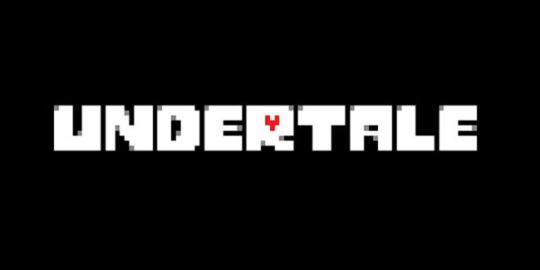
Undertale’s approach when it comes to choice is one that directly targets and addresses the player. Much of the characters’ dialogue with Frisk often address them as “the human”, which, depending on your stance, could be a comment meant to speak to Frisk as a character, or to you, the player, as a human being.
In fact, as much as I adore Frisk as a character all of their own, they aren’t necessarily given any defining personality traits. They are, in the purest of senses, meant to directly be an in-game representation for the whims and desires of the player. “They” act, “they” fight, “they” flee, but it’s always you, the player, making the decisions. This isn’t necessarily a unique concept, but it’s the way that this is applied that makes this particular idea special in Undertale.
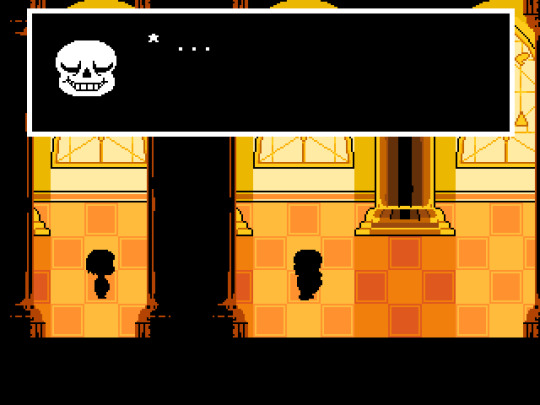
Obviously, the most noticeable instance of this is when Sans calls the player out towards the end of the game, explaining that those little levels and numbers that we, as the player, loved seeing go up, were affecting the world that we had just spent the last few hours immersing ourselves in. There is a direct effect of our choices on this universe. It is a pre-established place, and it will continue without us, the player, making an impact. In fact, in the neutral and genocide routes, you are actively making this universe a worse place! It puts the player in the position to act as themselves and make a decision about how they want to impact this virtual world. In essence, the decisions made by Frisk and you, the player, are presented as one in the same. Frisk isn’t necessarily seen as a vessel for your intentions, but rather, as your intentions themselves.
This created a unique meta-narrative when it came to the idea of how we, as players, consume media in universes. It presented the idea that universes made by creators aren’t just things to pick up and put down, but that each game world has their own story that continues onwards, with or without input. You aren’t seen as some great hero, but rather a nuisance at best, a mass murderer at worst. This was the way that Undertale addressed the idea of stories in their universe: you, the player, were seen as synonymous with Frisk, the character.
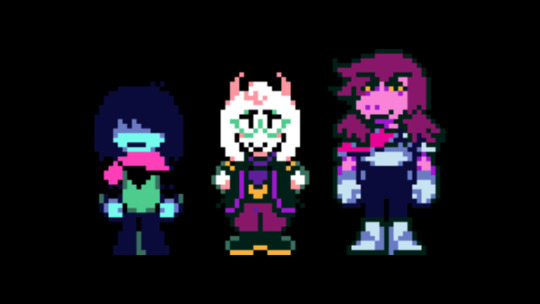
Deltarune took a different approach to this. Of course, it becomes instantly recognizable to players that “our choices don’t matter”, which is told to us almost immediately in the game. There are some sections of the game where the decisions you make don't directly influence the storyline, which differs from the narrative set by Undertale. It takes this idea of “choice” that we had pre-established going into the Deltarune experience by Toby Fox’s other works and toys with it.
Kris is their own individual. Kris has had a hard time making friends. Kris has a brother at college, and is a known town citizen. Kris is greeted by neighbors, classmates, and teachers. Kris loves chocolate and pies, shows anger at Spamton’s demise, and has a tendency to make some scary jokes (as referenced by Noelle). They are their own person. This is when Undertale and Deltarune start to split on the concept of choice.
Frisk was seen as the culmination of the player themselves, but Kris isn’t the player. This is what makes the ending of Chapter 1 particularly shocking– the idea that Kris could directly address us, the players, and our influence on them, by removing their soul. They don’t want to be the culmination of our actions. They want to be Kris.
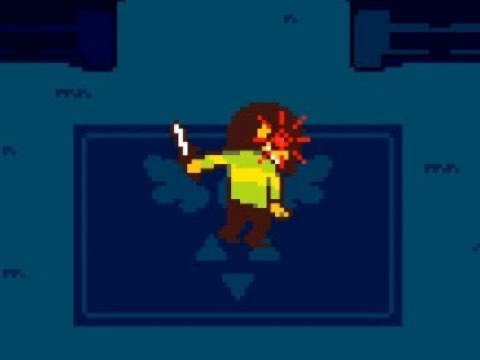
This is where the idea of choices is twisted from our prior conceptions. Just like in Undertale, our choices in Deltarune are either praised or criticized depending on how we interact with the world we are given. However, in Undertale, we are judged as players by the characters aware of our influence. In Deltarune, we are judged in a far more intimate setting: directly by the person we are instructing to do our bidding. Because, at the end of the day, our choices do matter in Deltarune. They just matter on a smaller scale. They matter to Kris.
In this way, both games address the way our choices are impactful; they just happen to do so in two, unique settings. I think this is what makes both Undertale and Deltarune so interesting– they have a similar concept, but they completely flip the script on what that concept means, and how it applies to universes.
#this is basically a love letter to toby fox's way of#adding themes to his games#deltarune#undertale#frisk undertale#kris dreemurr#kris deltarune#frisk deltarune#undertale theory#deltarune theory#utdr#undertale meta#deltarune meta#undertale analysis#deltarune analysis
117 notes
·
View notes
Text
Friend Inside Deer Theory

A very stupid and unlikely theory i made not meant to be taken seriously. Friend inside deer.
#Deltarune#deltarune theory#deltarune spoilers#deltarune chapter 3#Deltarune chapter 4#undertale meta#deltarune meta#dess#dess holiday#chara#chara undertale#chara dreemurr#Vessel#Vessel deltarune#the roaring knight#The knight#kakishirocream yaps#Utdr#safe utdr#Lmfao i thought this was funny
56 notes
·
View notes
Text
I think a lot about the Concept of ‘choices that matter’ in video games. Like, in terms of what it is that makes a choice ‘really matter’, what do we perceive as a choice that matters or has a consequence, how do different games with different amounts of branching or non-branching storylines play with those ideas… Especially because Undertale is one of my favorite games of all time, and it has often been hyped as ‘a game where your choices REALLY matter’ and… honestly, I dunno if all of this hype was fully conducive to Undertale. Because the way it handles the concept of Video Game Choices is actually a lot more interesting and complex than that simplistic descriptor makes it seem.
Because Undertale actually has a lot of choices that ‘don’t really matter’! Lots of dialogue choices and silly little decisions that on a first playthrough seem like they’re some sort of moral choice or a branching plotline but end up always leading to basically the same result regardless of what you do!
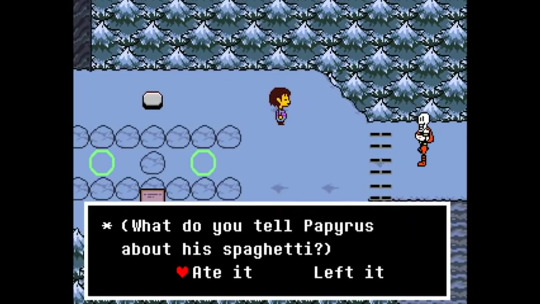
And the game doesn’t really try to hide the fact that these choices are kinda 'Fake'. I mean, on a first playthrough a player might assume there’s gonna be some Massive Consequences for picking the ‘wrong’ drink on Undyne’s date, but the game’s narrative expects for there to be multiple playthroughs and pretty much every Choice that Doesn’t Matter is peppered with that Undertale brand of wacky character-focused humor that inherently makes the moment memorable. Papyrus leading Undyne straight to you no matter what you do is basically a cross-timeline running gag.
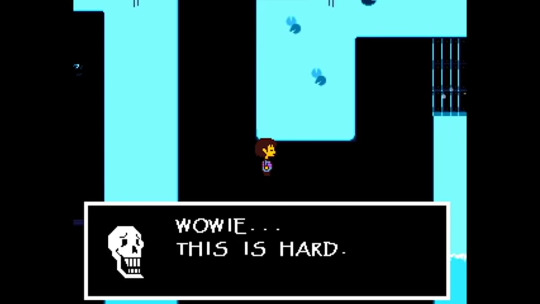
On some level I see this as a sort of gag that serves as meta-commentary about the expectations around Choices That Matter in Video Games. As in, a lot of games have their Moral Choices happen in clearly easily marked ‘this is a Moral Choice!’ moments within the story, while the actual gameplay (and any violence the player might cause as part of said gameplay) is basically entirely divorced from any element of narrative-branching and doesn't effect the story at all. Undertale basically entirely inverts this dynamic; the most important factor for which Route you’re own is how you handle your FIGHTs, and what seems like clearly-marked and obvious Moral Choices are just goofy insubstantial minor changes in dialogue.
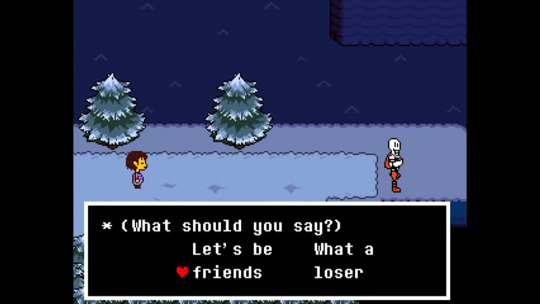
But also… there is also a level where you must ask yourself ‘what does it mean when we say that these choices Don’t Matter’. I mean, it’s not like they didn't change anything about the game, the Player still made the character say that other thing, the choice probably led to an alternate piece of dialogue, probably a joke with a call-back at the end of the game… The line between a one-off joke and an actual story-changing moment can be a little blurry if you look at it too deeply.

For example, near the end of the Waterfall part of the game, the Player is given the choice to save Monster Kid even at the risk of having to face down Undyne.

Pretty much anyone who isn’t deliberately trying to be an asshole is going to rush to save them and obviously that includes the Pacifist Route Players. But you can actually leave Monster Kid to die without it 'mattering' in the sense that it wouldn't divert you from the Pacifist Route. Undyne saves them instead of you, and ends up with slightly less HP for her battle (which might Matter for Runs when you try and FIGHT her but obviously not in Pacifist Runs) and… by the end of the game, during the extremely happy True Pacifist Ending, they still clearly remember that you abandoned them and are upset by it.

So… does saving Monster Kid ‘matter’ or not? On one hand, choosing not to save them mostly just changes a few lines of dialogue but… these lines of dialogue kinda recontextualize this happy ending and the Player’s actions in general. Despite the True Pacifist Ending otherwise portraying the Player/Frisk as a kind-hearted and brave hero... they still did this undeniably cowardly (and perhaps even cruel) act to one of their friends .
Was running away and leaving Monster Kid to die a brief but significant moment of weakness that the Player regrets and has cost them what could’ve been the start of a lovely friendship? Or is that simply that being a True Pacifist was always more of a matter of pragmatism rather than ideals? Were they only acting as a Pacifist to get that promised 'Best Ending', and only Monster Kid has an inkling they are not as heroic or kind as everyone thinks they are?
And then there’s the Snowman ‘quest’.
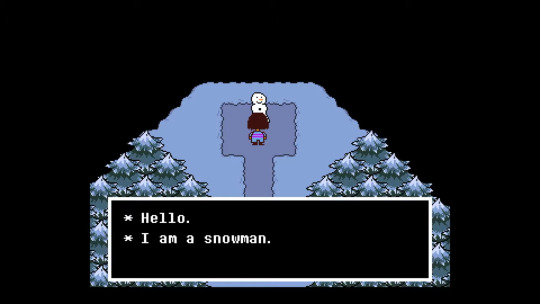
A free healing item given early in the game, with your mission being to carry it along in your inventory for as long as you can without ever consuming it. The only reward you will ever see from it is a few lines of dialogue…

But for many, it is more than enough of an incentive to preserve the Snowman’s Piece. You can do whatever you want with the Snowman without it ‘mattering’ in terms of Ending or consequences. You could carry it through all of your adventures with care and kindness... or you could eat it while he can’t see you and then go back to him and tell him that you ‘lost’ it and then get another piece and eat that as well, you could eat it right in front of his face, horrifying him.

And much like with Monster Kid, you can STILL get the True Pacifist Ending after doing that, all that would change is a few optional pieces of dialogue from the Snowman…

And a total recontextualization of the Player’s behavior and the ending. The Snowman sees the Player as a cruel and heartless person who is just pretending to be good so they can be liked - the way they acted with this immobile, powerless Snowman who could do nothing for them and their reputation reveals their true self. And he says their friends will realize that too one day...
Doing a True Reset on the Pacifist Ending is, by definition, a (almost) consequence-free action and yet it changes future Pacifist Routes immeasurably. Turning the Player into a Hypocrite doing the exact same thing they were trying to stop Flowey/Asriel from doing - trapping all of their friends into a time-loop so they can play with them forever while never actually letting them to enjoy freedom on the surface, simply because they are not willing to move on or put their friends' wishes and agency above their own. Nothing in the game actually changes, not one character can even suspect that you did something like that, and yet for the Player - this choice makes the entire Meaning of the game flip on its head.
Even the most famous and heavily-toted Big Consequence in the whole game - selling your soul to Chara after completing a Murder Route… mostly what it does is just… recontextualize the ending of the Game.
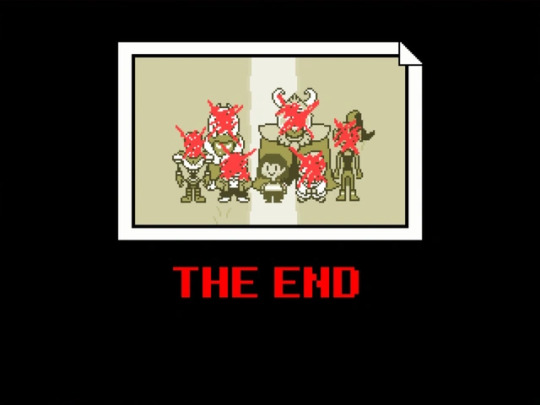
As a game, ‘Undertale’ is very much about the ways in which a Player engages with a game can radically recontextualize it. The huge chasm of difference between the Pacifist and Muder Routes is just the most literal example of it. But, in a way, even the tiny little Dialogue Options - where the lack of real choice and consequences is Obviously a Joke - matter. Because of the way they can recontextualize the Player Character’s behavior.
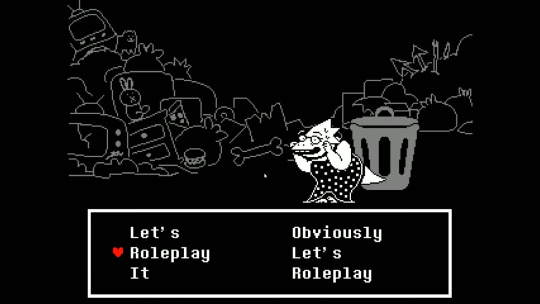
(Okay, maybe not this one, but hear me out…)
Do you trust Papyrus to not betray you, even after you spied on him with Undyne?
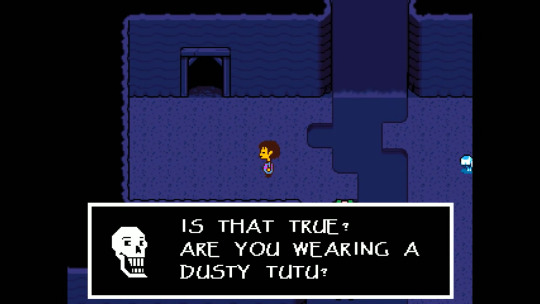
Do you have the integrity to admit you forgot something or got it wrong even when there’s no consequences for just lying about it?
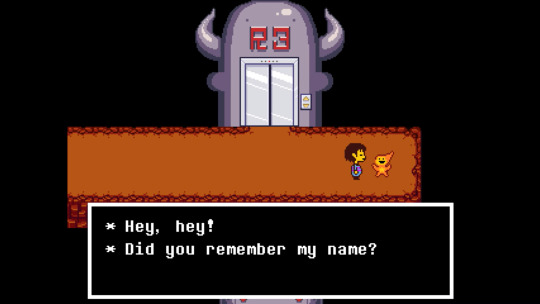
Are you a hypocrite for trying to get Alphys to be truthful with Undyne only to then immediately turn around and lie to Undyne yourself?
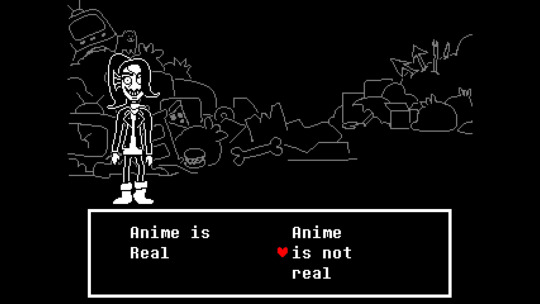
None of these choices matter for the ending, some of them don’t even get, like, a call-back joke or anything, but… if you are engaged in this story as a narrative, if you are invested in these characters as if they were people, if you are honestly trying to be the best person you can be, if you are trying to self-reflect at the way you approach this game… even the silliest little dialogue option can suddenly be imbued with deep implications and you can make them matter.
Undertale is one of the best demonstrations of this concept, but this is absolutely not exclusive to it. For example….
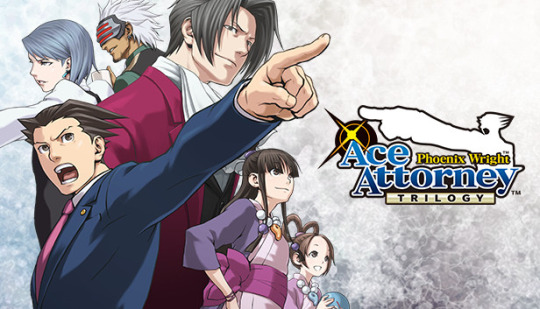
‘Ace Attorney’ is pretty much as far away as you can get from a ‘branching narrative’ within the video game sphere. It is a heavily-linear Visual Novel where 70% of the time it won’t even let you talk to random characters at anything but the exact order it expects you to and any ‘Bad Endings’ are basically just glorified Game Over Screens. (... because this is the Internet and something something piss on the poor, I should probably specify that I am talking about ‘Ace Attorney’ because I love Ace Attorney and these are neutral descriptions of the game and not complaints. There’s nothing wrong with a game being linear.)
If there’s any Dialogue Choice in AA, it’s generally a very basic ‘right answer-wrong answer’ choice between Progress and a Penalty, or a total non-choice that just gets you to the same final result regardless. Except… Well… as we just talked about, getting to the same final result doesn’t necessarily mean a choice is ‘meaningless’, does it?
There’s actually a lot of great storytelling moments where Ace Attorney, despite its otherwise strict linearity, uses this exact sort of recontextualizing mindset I’ve talked about with Undertale to make choices with some really powerful emotional impact…. Even if technically, the ending is the same ending. It can be something as basic as ‘even if picking this Wrong Answer doesn’t get me a penalty, it still embarrassed my character and disappointed my friends/rivals and thus I feel bad for picking it’. Consequences as recontextualizing your character as more incompetent than they should’ve come across at that moment.
And then there’s moments like the iconic ending of ‘Justice for All’. That moment before Franziska bursts into the Courtroom with the case-making evidence and saves the day. The moment where it seems like Phoenix really is gonna have to pick between protecting his best friend and carrying out a rightful sentence.

The player gets to pick between the two options, but Phoenix never gets to say his choice out loud before Franziska comes running in... and yet… he, and the player, still made that choice. Even if no one ever has to experience the consequences of your choice, even if the rest of the world has no idea what Phoenix Wright would’ve chosen if the Miracle hadn’t happened, we know what we picked and that knowledge of the choice matters. Because of how we feel about this choice and what it says about our interpretation of Phoenix… and about us.
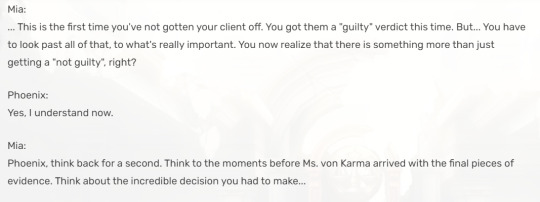

There’s also a bit of this ludonarrative device in ‘The Great Ace Attorney: Adventures’. During “The Adventures of the Runaway Room”, when you investigate the Omnibus for the second time and start finding things that… don’t quite fit together. When you’re finally starting to make progress with proving McGilded’s innocence, while also maybe starting to notice that something is… wrong with these pieces of evidence.

The unchanging linear narrative of the game is that Ryunosuke does eventually realizes McGilded's trickery, puts truth ahead of victory in court and yet, despite his effort and good intentions - the case still ends with a false Not Guilty verdict. And yet, the Player has the choice to... tweak the details.
There are several points where Ryunosuke can object, where he can call out the inconsistencies even though they help his case, where he can support Van Zieks in his accusations of tempered evidence... or he can not. Not necessarily intentionally misleading the Court as much as subconsciously trying to ignore the inconsistencies in the name of trusting his client.

And yet… in the end it doesn’t matter. Maybe Susato calls out the inconsistency instead of him, maybe Van Zieks does, maybe it remains uncontested but... no matter what you do, the case will end with a Not Guilty verdict (I mean, I guess you can deliberately fail the game but that will not progress the plot), McGilded doesn’t seem like he held a grudge (in the few minutes he had left to live), and a few cases later - Ryunosuke would always be punished for his part at this false verdict.
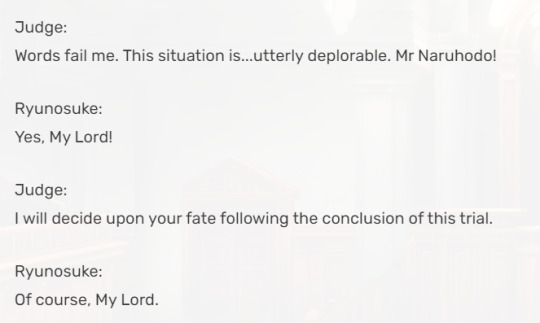
So it doesn’t really matter what Ryunosuke did back then? Does it matter if he did his best and called out every single inconsistencies or if he kinda half-assed it until he (and the Player) had to? He’s still going to suffer the same consequences down the line. And yet….
And yet, I think there’s something so powerful about giving us that option. About knowing that Ryunosuke, and we, did try and do something about McGilded's dirty tricks- even if it didn’t work. Or alternative, knowing that there was more that Ryunosuke and us could’ve done even if it was not nearly enough. Even if in the eyes of the game and the British Justice system there is no difference, the fact that we know what did and what we could’ve done can radically change the way the player feels about all of the later scenes concerning the truth about McGilded’s trial. It can radically change the way the player interpret Ryunosuke’s feelings about it as well.
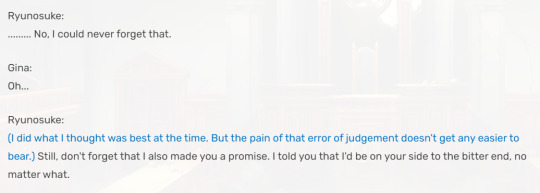
Because even though the game itself keeps playing along with the same script regardless, that trial had irrevocable consequences for the Player.
#undertale#ace attorney#ut#utdr#undertale analysis#undertale meta#ace attorney meta#the great ace attorney#under tale#tgaa#tgaac#dai gyakuten saiban#tgaa1#gaac#great ace attorney#aa2#justice for all#aa jfa#ace attorney jfa#farewell my turnabout#ace attorney justice for all#aa justice for all#phoenix wright#ace attorney trilogy#aa trilogy#phoenix wright trilogy#pwaa#phoenix wright ace attorney#gyakuten saiban
806 notes
·
View notes
Text
What are the salient features of Asriel, post-canon, that keep us from "saving" him from life alone in the Underground?
He's soulless (a practical problem),
he'll soon return to being a flower (a practical problem) and would prefer that you think of him like this rather than Flowey (a personal and interpersonal problem), and
he's decided to stay and tend the grave of the fallen child (and this is not really a problem at all; rather, a decision, which the boundary conditions of Undertale require us to respect).
There is a lot of UT post-canon fic out there which treats all these as practical problems. Frisk can just get a soul from somewhere, throw Alphys technobabble or soul arcanobabble at the body issue; get Flowey in therapy; and... also get Flowey in therapy for that last one, because his decision isn't really legitimate, in save-the-goat stories. It's self-harm. Which, personally, is both understandable and missing the point of one of the game's core themes: no matter how many times you restart the story, there are things you can't do; you are not getting a 100% Complete Perfect Pacifist where even Asriel is saved, and it's okay to be wistful about it, but you still need to put down the controller eventually. Getting him to the surface happens a lot in fic, because we all want the goldenest ending, but it could never happen in canon and we just have to live with it. It's thematically potent and I'd lose a lot of respect for Undertale's commitment to its story if you could circumvent it.
(Incidentally, this feels to me like it stems from the same ideas as making "* I have places to be" the wrong answer, a giving-in to Frisk's self-sacrificing, self-disregarding nature which must be corrected. Sometimes, you have to let people live and make their own decisions, outside the boundaries of the story's frame. Your perspective only goes so far.)
...now, fluffier, more sympathetically-traumatized Asriel, on the other hand...!
Ralsei's woes in Deltarune are very visibly the same kind of isolation as what Asriel's dealing with at the end of Undertale, but a) it's worse (a whole lifetime of waiting in a very deliberately empty, lifeless, three-screen-long kingdom) and b) he's stuck there for purely practical reasons. Darkners can't enter the Light World without becoming objects. He never made a decision to be here.
It's not something we can technobabble our way out of right now, but we're only in Chapter 2, right? We can save him, in a way we can't save Asriel: the deadlock we can't resolve has been removed; we don't really have to think about his preferences any more, because the preferences that kept us from helping him and left him stuck in the Underground I mean Dark World are just gone.
His issues are also much more obvious from the get-go, and seem designed to be something we talk him out of – not Asriel's decision to stay by his lost friend's grave, with a weight of meaning and feeling behind it, but hero worship, subservience, religious dedication to the Prophecy and self-image issues, all clear and visible dysfunctions. Giving Asriel therapy has left the realm of fanfiction and wish fulfillment and become part of canon... and the real disagreements we had with UT!Asriel over what he was and meant and deserved have become simple roadblocks for DR!Asriel whoops I mean Ralsei, things we have to help him through. Practical problems where the solution is friendship speech + therapy.
To make a slightly heavy-handed comparison, Ralsei saying we exist to serve Lightners and gratefully referring to himself as Kris's lackey is Anthy saying I'm the Rose Bride because I like it. It's the kind of reason we're inclined to reflexively overrule without working to deal with it at its root. Ralsei is Asriel, minus the irreconcilable and bittersweet parts, someone whose objections to being helped have either been removed or simplified down until we can feel good about disabusing him of them. He's our wish fulfillment in the way that candy on trees might be Susie's and a city of shining lights might be Noelle's and Giant Arcade Consoles might be Berdly's: an Asriel you can help, who you can make go to therapy and deal with the problems that keep him from caring for himself; who'll shut up, comply and let himself be saved.
...so the fact that Kris – whose personal issues are opaque, complex, and frustrating; who appears to be actively hiding parts of their life and motives from us; who clearly doesn't want our help or an improved social life at the expense of their agency – finds him so distasteful might not just be because he's a parody of their brother or Secretly Evil or whatever. If Ralsei is "the kid they're supposed to be" it's not just his fluff and horns!
113 notes
·
View notes
Text
I do think both Flowey and Chara can reflect 'the player', but they act very differently, and would reflect very different types of players.
Flowey wants to learn everything, to be entertained. Chara wants to have all the high scores, to win. Flowey explores every single route, eventually growing bored and seeing the world as numbers. Chara grinds, pretends at pure apathy and distance very well, and doesn't see a point to replaying.
When Chara criticizes a player of 'perverted sentimentality', they'd probably level the same criticism at Flowey. And from some of Flowey's dialogue, it sounds like they may have hated the power of Reset even in life.
Alternatively, I think they might be in conversation with the player in slightly different ways: Chara at the end of No Mercy is the means by which the game says 'look what you've done'. Flowey in every route is the means by which the game says 'look what you ARE'.
(Chara may represent the sort of player who may choose the No Mercy route, but ultimately Flowey is the main player-metaphor and Chara only truly appears to cast judgement, so I'm once again thinking it feels? A little weird? To place Flowey Mannerisms on them?)
44 notes
·
View notes
Text
youtube
Time and time again, people have tried to discredit Alphys' work in the Determination Experiments by crediting at least some of the True Lab entries to Gaster. A recent theory making the rounds has once again misled people into taking this as fact, and in this video, I take a critical look at the entries to prove that Alphys wrote all of them as well as debunking several of the arguments used to claim that Gaster was involved. Sources include both Undertale and Deltarune, the Undertale Gaster twitter takeovers, the Legends of Localization book, and the recent Valentines newsletter. My goal in this video is to put this argument to rest, as it relies on many cherrypicked pieces of information that really don't hold up under scrutiny and are a disservice to Alphys and Gaster both.
#undertale#alphys#dr. alphys#gaster#wd gaster#undertale meta#undertale analysis#utdr#true lab#dr alphys#video#Youtube
574 notes
·
View notes